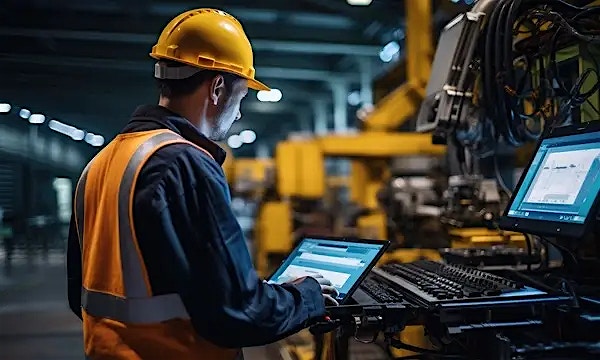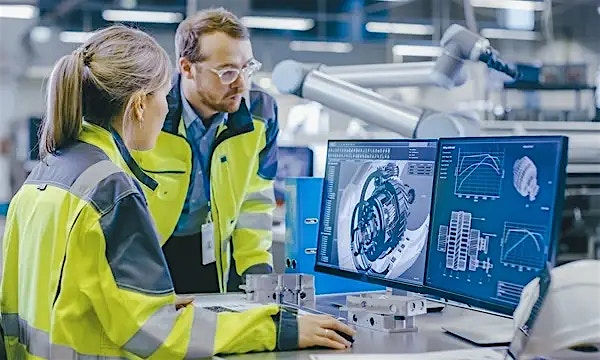The manufacturing industry continues to grapple with a myriad of challenges, like geopolitical instability, labor shortages, climate regulation and rising inflation to name a few. Generative AI (GenAI) is emerging as a technology that is poised to revolutionize the sector and enable organizations to sustain and maintain their competitiveness in terms of quality, flexibility and cost.
HCLTech is working with many manufacturing organizations who are productionizing GenAI in common services like HR, marketing, legal, marketing, IT and infrastructure code development, while experimenting with GenAI tools in core business processes geared toward supply chain, manufacturing operations, aftermarket, safety and EHS.
“Overall CXOs are quite optimistic about their business and industry performance...Some are conducting pilots aligned to shop floor processes in areas such as supply chain optimization and improving their aftermarket experiences,” said Shankar Gopalkrishnan, Executive Vice President – MFG and TTLH at HCLTech.
While the manufacturing industry is still in the nascent stages of GenAI adoption, there are a few forward-thinking manufacturers already moving from proofs of concept to adopting and implementing GenAI at scale.
To seize this opportunity and chart a course for success, manufacturers need an experienced transformation partner, as well as access to a strong ecosystem of major cloud providers and technology partners.
A custom approach
According to Gopalkrishnan, a custom approach should be taken for each enterprise when it comes to embarking on any GenAI project. Each requirement is unique. To facilitate this, he highlights the importance of domain led design thinking workshops and utilizing HCLTech’s GenAI Labs for use case validation and quicker adoption for scaling.
“Every enterprise is unique, and we take a custom approach for each of them, we provide our customers a very unique opportunity to share their vision via our domain led design thinking workshops, validate their use cases in our GenAI Labs, and establish a foundational data layer that allows use case deployment,” said Gopalkrishnan.
GenAI manufacturing use cases
Gopalkrishnan shared several use cases that showcase the transformative potential of GenAI in the manufacturing sector. For an American timber manufacturing company, HCLTech implemented a “connected mill” enabled by GenAI to improve shop floor productivity.
“We monitor their critical machine process in the value chain, predicting any potential downtime of the machine, while providing a voice-enabled recommendation on corrective actions to the line operator so the downtime can be mitigated,” he explained.
For a global building management OEM, HCLTech leveraged conversational AI to increase sales resource productivity by enabling the sales reps with product data, competitive benchmarking, pricing and inventory status in real time by analyzing the data and predicting all possible scenario simulations.
Additionally, for a specialty manufacturing chemicals company, HCLTech implemented a supply chain optimizer with GenAI that improved their supply chain process to meet sales and operations planning (S&OP) compliance and overcome continuously arising problems, ensuring customer demands and expectations are met.
“It works across the entire value chain and enables different personas, like planner, buyer and seller, visibility into customer, demand, inventory and supply status, all on a real time basis,” said Gopalkrishnan.
Responsible AI frameworks
When deploying any AI technology, it’s vital to build a responsible AI framework across an organization, ensuring data security, transparency and the ethical use of AI technologies.
Commenting on this, Gopalkrishnan said: “We are helping our customers, not only with the scale implementation, but also to establish an AI governance framework to ensure data security transparency, as well as a code of conduct while using Gen AI. Our industry principles and domain SMEs provide deep understanding of business processes and work with customers to define and implement the specific value chain based GenAI use cases.”
Building the factory of the future
The “factory of the future” will be a human-centric, sustainable operation enabled by an underlying layer of AI and data analytics. HCLTech’s Industry NeXT framework drives technology adoption and enables customers to establish the core foundation for the factory of the future’s value chain, with GenAI evolving as an overarching layer across the entire operations.
Gopalkrishnan anticipates that in the next two years, GenAI will become integrated into most business functions within manufacturing, leading to significant savings in repetitive human efforts and enabling businesses to transform their products and services. To sustain competitiveness, he emphasizes that enterprises must embrace GenAI and other emerging technologies, transform their culture and upskill their workforce.
“To sustain this competitiveness in this market, every enterprise will have to embed GenAI and other emerging technologies, they'll have to transform their culture and bring innovation at core and continue to upskill their workforce,” said Gopalkrishnan.





